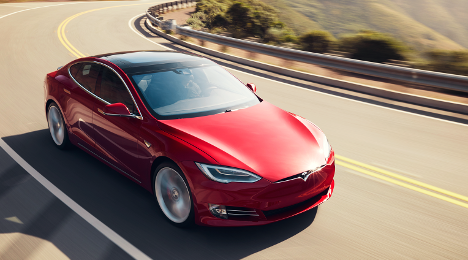Tesla’s used market performance surpasses GM and Ford

The Tesla Model S. Photo courtesy of Tesla.
By subscribing, you agree to receive communications from Auto Remarketing and our partners in accordance with our Privacy Policy. We may share your information with select partners and sponsors who may contact you about their products and services. You may unsubscribe at any time.
CARY, N.C. –
Pre-owned Tesla Model S vehicles sell notably faster than some of its U.S. counterparts’ best-selling used models, according to Autolist.
The firm recently released a study that delved into used Tesla vehicles’ overall market performance relative to those of General Motors and Ford.
The pre-owned Model S averages 87 days on market, 5 percent below its peer group, reports the buyer intelligence firm’s study titled, Changing of the Guard: Tesla vs GM & Ford. That peer group includes the Audi A7, Porsche Panamera, BMW 6 Series, Mercedes-Benz CLS, and Lexus LS 460.
The top used models from GM and Ford — the Ford F-150, Chevrolet Silverado 1500, Chevrolet Malibu and Ford Fusion — spent between 88 days and 104 days on the market.
Additionally, the Model S also has higher pre-owned prices relative to expectations than top-performing GM and Ford vehicles.
Prices of the Model S have trended between 3 percent and 5 percent above expectations for the past year.
Subscribe to Auto Remarketing to stay informed and stay ahead.
By subscribing, you agree to receive communications from Auto Remarketing and our partners in accordance with our Privacy Policy. We may share your information with select partners and sponsors who may contact you about their products and services. You may unsubscribe at any time.
Meanwhile, prices for the top-performing used GM and Ford models have trended within 1 percent (above or below) expectations throughout the past year,
To compile this study, Autolist’s analysts took a look at more than 10 million vehicles from April 2016 to January.
“One thing important to understand about our study is — why we think its impactful — is because it’s a comparison relative to a peer group. And that’s a really important element of this analysis because if you’re just comparing raw numbers overall, you can control a cross segment,” Alex Klein, vice president of data science at Autolist, said in a phone interview with Auto Remarketing.
“But what this is really about is … Tesla’s performance relative to its competitors and Ford and GMs performance relative to its competitors. And when you think about things through that lens, that is really what drives brand perception, market value, investment financials, and so on and so forth.”
With the next Tesla model — the Model 3 — set to debut later this year, Klein said the brand's performance in coming years could be determined by the reception of this model, which would be its first mass-market vehicle.
“They have thus far just been a luxury market loyalty group,” he said. “And so when you introduce a mass-market vehicle at scale, there are a lot of potential benefits to getting more people involved with what is an incredible brand at a baseline level.”
According to a J.D. Power report released last month, drivers who purchase the brand’s lowest-price sedan are less likely to be comfortable with any technology-related snags.
Klein said, “Getting the Model 3 involved will get more people to engage with the Tesla brand and could potentially even further accelerate their performance relative to competitors as more car buyers are able to move from a traditional petroleum powered car to an electric vehicle.”
He said Tesla customers are likely to become interested in buying EVs over the long-term, which again has benefits for Tesla, but could also have benefits for other EVs on the market in the future, too.
“When you are buying a Tesla you are buying a next-generation automobile. There’s a perception that people are pushing the bounds of technology and they are being part of the forerunners of next-generation technology whenever they step foot in a Tesla,” Klein added.
More info on the study can be found here.


